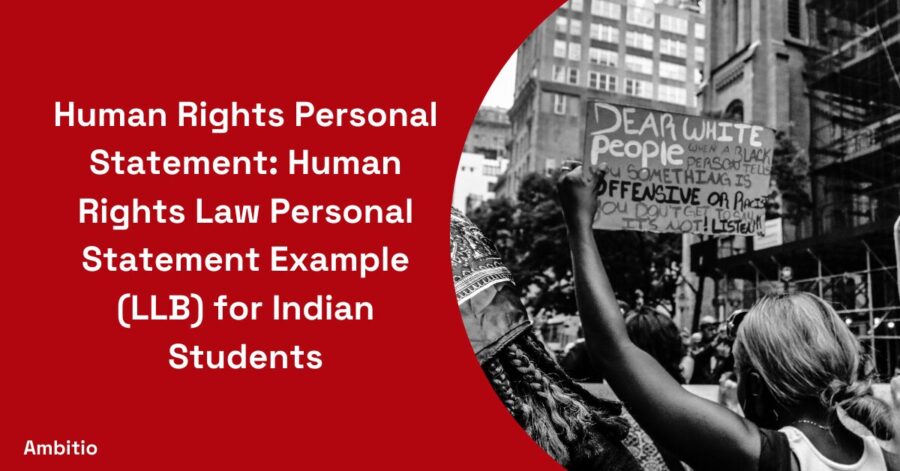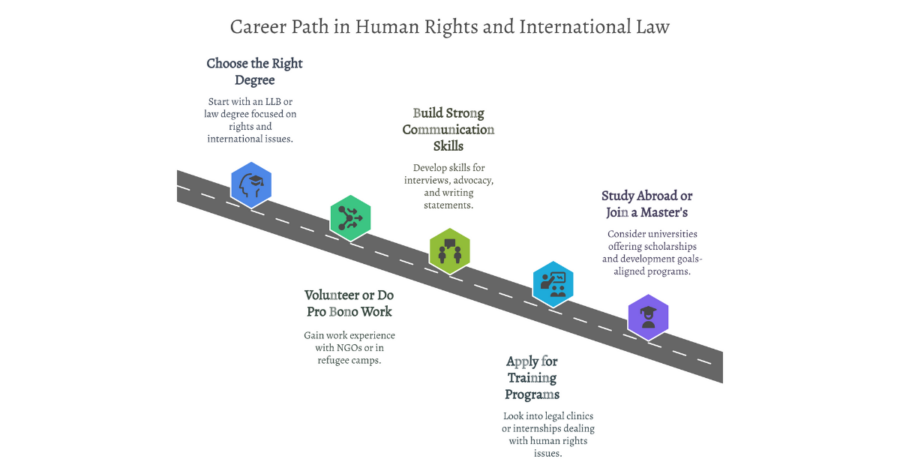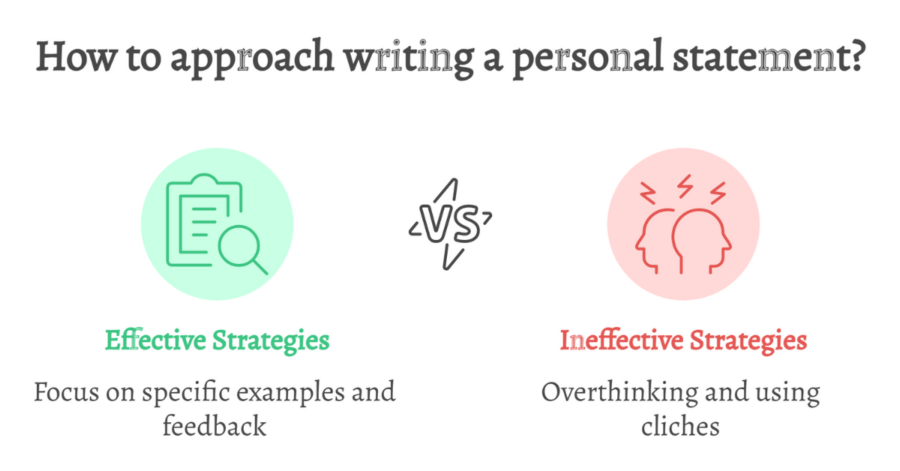8 May 2025
6 minutes read
Human Rights Personal Statement: Human Rights Law Personal Statement Example (LLB) for Indian Students

Key Takeaways
- Human rights personal statement should highlight your passion for justice, ethics, and international human rights law through real-life experiences.
- Human rights personal statement must reflect strong communication skills, academic interest in law, and commitment to social equity and human rights advocacy.
- Human rights personal statement should include relevant work experience, leadership skills, and a clear statement of purpose tailored for an LLB or law degree.
So you want to study law at university and are drawn to the powerful pull of human rights? That says something about your values. From witnessing injustice to dreaming about change, many Indian students discover their interest in law through the lens of human rights.
This article dives into how to write a personal statement, builds on strong personal statement examples, explores how to pursue a career in human rights advocacy, and highlights scholarships, work experience, and the best universities. If you’re interested in criminal law, refugee rights, or women’s rights, you’re in the right place.
What is a Personal Statement for Undergraduate in Human Rights and International Law?
A personal statement is your way of telling universities who you are and why you deserve a place in their law program. It’s more than a CV; it’s a statement of purpose, your voice on paper. A law statement should clearly reflect your interest in law, especially human and social rights, along with your leadership skills, ethics, and analytical mindset.

Whether it’s an example law personal statement or a fresh write-up, it needs to reflect real passion. It also needs to connect your life experiences with your desire to study an undergraduate degree in international law.
How to Pursue a Career in Human Rights and International Law?
Did you know the United Nations has over 190 member states working on shared goals around human rights? You could be part of shaping that global dialogue.
To pursue a career in human rights and international law, follow this path:
- Choose the right degree: Start with an LLB or law degree focused on rights and international issues.
- Volunteer or do pro bono work: Gain work experience with NGOs or in refugee camps.
- Build strong communication skills: These help in interviews, advocacy, and writing related statements.
- Apply for training programs: Look into legal clinics or internships dealing with human rights issues.
- Study abroad or join a master’s in human rights: Consider universities offering scholarships and development goals-aligned programs.
What are Some Human Rights Violations and Human Rights Issues Dealt With by the Human Rights Laws?
Fun fact: The “Universal Declaration of Human Rights” was adopted in 1948 and remains a global benchmark.
Human rights focus on violations that challenge inalienable rights. Here are common issues tackled:
- Detention without trial
- Violations against women’s rights
- Discrimination based on nationality or citizenship
- Suppression of freedom of speech and religion
- Exploitation of migrant and low-income communities
Comparison Table of Human Rights Violations vs. Issues:
| Human Rights Violations | Human Rights Issues |
|---|---|
| Torture in custody | Social equity |
| Child labour | Ethics in the legal system |
| Forced displacement | Refugee protection |
| Unlawful detention | Development goals |
| Discrimination in education | Gender and education access |
How to Write a Human Rights Related Personal Statement for Admission (Sample Statement)?
Below is a sample statement for students interested in human rights and international law.

This law statement example includes a strong interest in criminal law, communication skills, and pro bono exposure.
Sample Personal Statement
My name is Rhea Kapoor, and I aspire to study law at the University of Warwick, focusing on international human rights. My interest in law began in the eighth grade when I stumbled upon a report on child detention in India.
I could not unsee what I read. The idea that children—many without access to lawyers—could be locked away disturbed me deeply. As I continued reading about these injustices, I realized I had found my calling: to be a human rights advocate. I started volunteering with “Justice for All,” a local NGO working with underprivileged minors. My time there gave me direct exposure to human rights issues and taught me the value of pro bono legal aid.
Growing up in Delhi, I saw the harsh realities faced by low-income communities. These experiences developed my communication skills and strengthened my sense of ethics. I began taking part in debates focused on women’s rights and refugee policies. Each time, I was reminded that law and order should always protect the most vulnerable.
I also interned at the Delhi High Court for two months. I shadowed a criminal law attorney who worked on a wrongful detention case. It was here that my interest in criminal law solidified. I saw how legal systems could be either instruments of justice or barriers to it.
To better understand global human rights frameworks, I took an online course in international law. It introduced me to the importance of treaties, citizenship policies, and social equity debates. I scored a 7.5 on IELTS and an ACT score of 33, showing my readiness for international academics.
My statement of purpose is to become a voice for those who remain unheard. I aim to pursue a master’s in human rights after my UG degree and hope to work with the United Nations someday. Law, for me, is not a profession but a tool for change.
From “Universal Declaration of Human Rights” to “On Human Rights”: Top 10 Books for this Subject
Fun fact: Eleanor Roosevelt chaired the committee that drafted the Universal Declaration of Human Rights. Pretty powerful, right?
Here are ten books to get you started on your human rights journey:
- Universal Declaration of Human Rights: A Commentary
- On Human Rights by James Griffin
- The International Human Rights Movement by Aryeh Neier
- Half the Sky by Nicholas D. Kristof & Sheryl WuDunn
- We Wish to Inform You That Tomorrow We Will Be Killed with Our Families by Philip Gourevitch
- The Human Rights Revolution by Petra Goedde
- The Last Girl by Nadia Murad
- Are Women Human? by Catharine A. MacKinnon
- International Human Rights by Rhona K.M. Smith
- Human Rights: A Very Short Introduction by Andrew Clapham
What are the Scholarship Requirements and Availability for Human Rights?
Fun fact: Several scholarships now prioritise applicants with a background in volunteer or pro bono work.
Here are the essentials:
- IELTS or TOEFL scores
- Interest in human rights or related subjects
- Low-income or refugee status may qualify for aid
- GRE or SAT scores (for some universities)
- Evidence of leadership skills and ethics
Scholarship Comparison Table
| Requirement | Availability |
| IELTS/TOEFL | Almost all programs |
| ACT/GRE/SAT | Some UG/PG |
| Volunteer Experience | Required/preferred |
| Low-income background | Offers full/partial aid |
| Statement of Purpose | Mandatory |
Top 10 Universities Offering Human Rights Programs
Did you know that Harvard Law School offers a dedicated Human Rights Program with pro bono fieldwork?
Here are the top 10 universities in the USA and UK:
| Sl. No | Country | University | Fee (Approx.) | Personal Statement Requirements | Programs Offered |
| 1 | USA | Harvard University | $65,000 | Statement of Purpose + ACT/GRE | LLB, Masters in Human Rights |
| 2 | UK | University of Oxford | £39,000 | Statement | BA in Law with International Law |
| 3 | USA | Stanford University | $63,000 | Statement + Work Experience | International Human Rights Law (LLM) |
| 4 | UK | University of Cambridge | £38,500 | Statement of Purpose + IELTS | UG Degree in Law |
| 5 | USA | Yale University | $64,500 | Statement | Law and Human Rights Advocacy |
| 6 | UK | LSE (London) | £36,000 | Statement | Law with Human Rights and Ethics |
| 7 | USA | Columbia University | $67,000 | LLB Statement Required | Criminal Law and Social Justice |
| 8 | UK | King’s College London | £37,000 | Statement | International Law and Human Rights |
| 9 | USA | NYU | $61,000 | Statement of Purpose + TOEFL | Human Rights & Global Development Goals |
| 10 | UK | University of Edinburgh | £34,000 | Interest in Law & Human Rights | LLB + Human Rights Training Program |
Conclusion
Choosing to study law with a focus on human rights is a commitment to making the world more just. From writing a compelling law statement to exploring scholarships and understanding key human rights issues, this article covers every step.
You now have access to an example statement, top universities, and the knowledge of how to pursue a career in human rights. Whether you’re interested in criminal law, refugee policy, or ethics, there is a place for your passion.
Now is the time to write a statement that shows your commitment to rights and international justice. So what are you waiting for? Choose Ambitio and give wings to your study abroad dreams!
FAQs
What should I include in my human rights personal statement for undergraduate admissions?
A human rights personal statement should include your motivation to study law, relevant experiences, academic background, and your long-term goals in human rights advocacy.
How long should a human rights personal statement be for an LLB application?
Most universities expect a human rights personal statement to be between 500 and 1,000 words, clearly reflecting your interest in law and relevant achievements.
Can I mention volunteer work in my human rights personal statement?
Yes, including volunteer work in your human rights personal statement shows commitment to social justice, refugee support, and underprivileged communities.
Should I include my interest in international law in a human rights personal statement?
Absolutely. A strong human rights personal statement highlights your passion for international law and its role in addressing injustice and global issues.
How do I make my human rights personal statement stand out?
To make your human rights personal statement stand out, include unique experiences, leadership skills, and a genuine commitment to human and social rights.
Is work experience necessary for a compelling human rights personal statement?
While not mandatory, work experience adds depth to your human rights personal statement, showing real-world engagement in law and order or pro bono initiatives.
Can I reuse my human rights personal statement for multiple university applications?
You can reuse your human rights personal statement, but always tailor it slightly to match each university’s law programs and values regarding human rights.

You can study at top universities worldwide!
Get expert tips and tricks to get into top universities with a free expert session.
Book Your Free 30-Minute Session Now! Book a call now




























